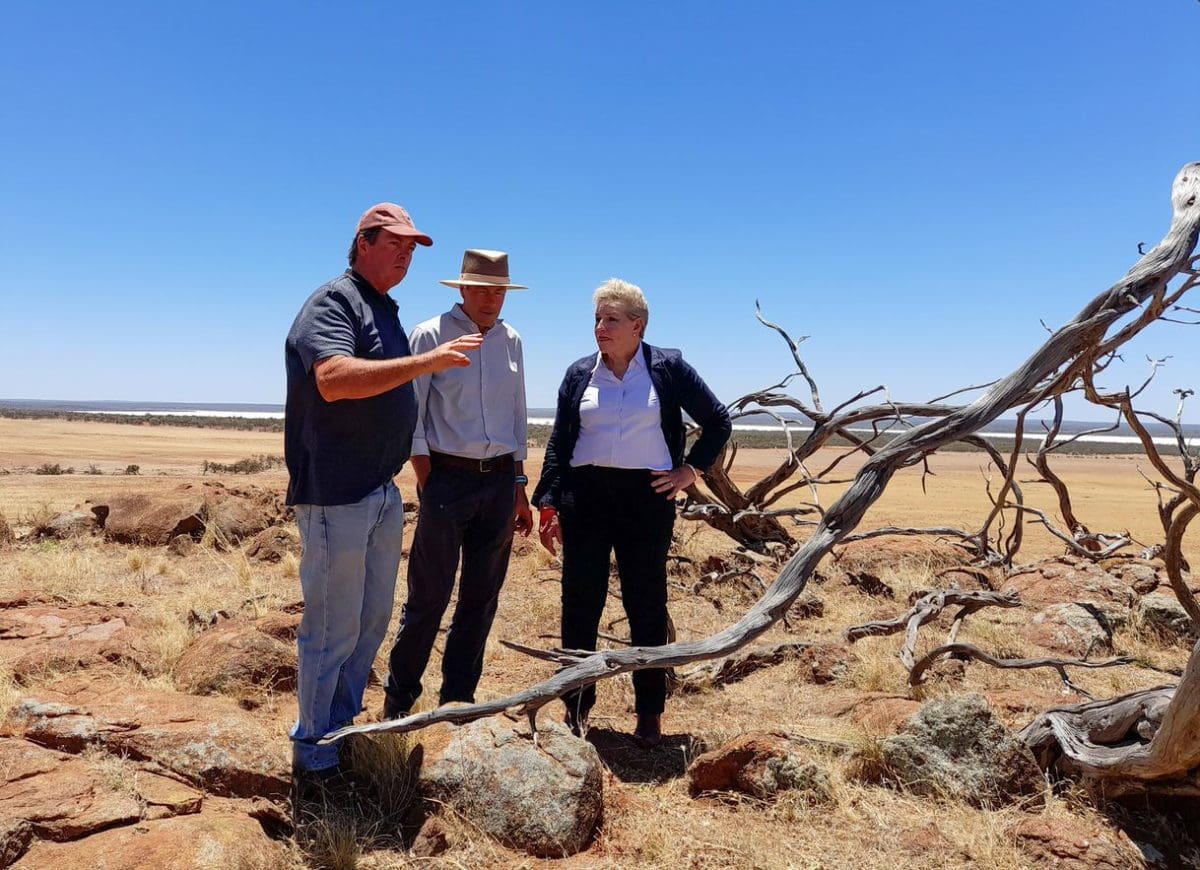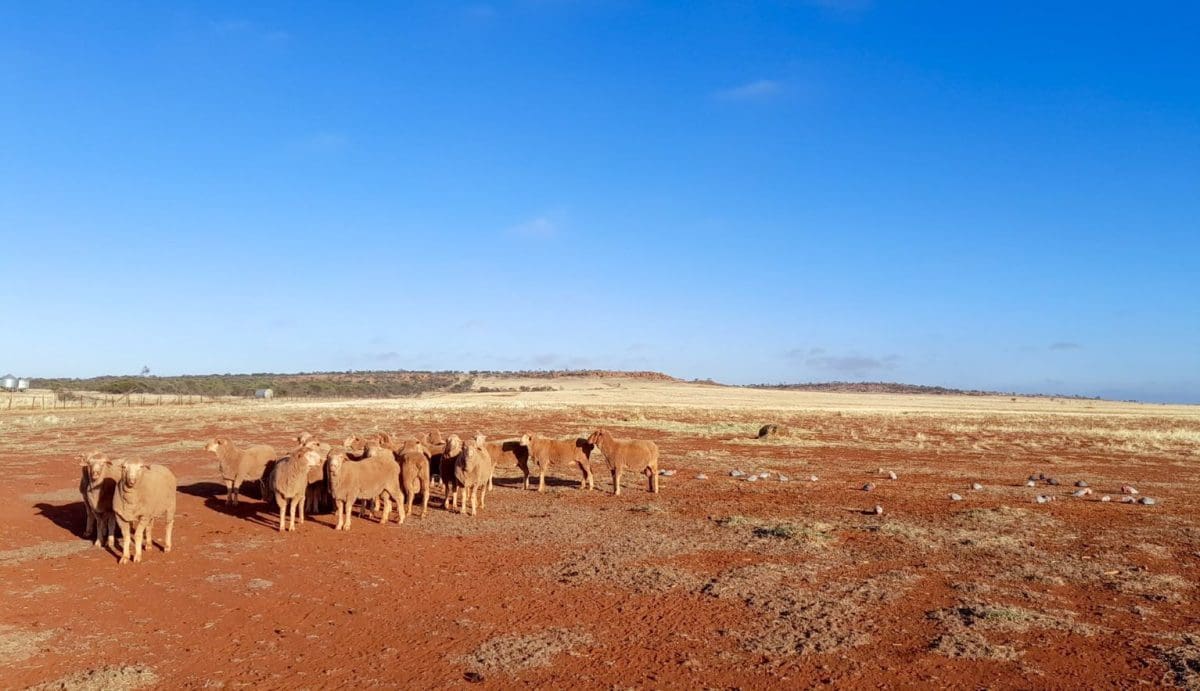
Weelhamby farm manager Phil Logue, Weelhamby project founder and investor David Martin and WA Agriculture and Food Minister Alannah MacTiernan. Photo: Weelhamby Project
THE Western Australian Government on Thursday pledged $3.2 million through its Carbon Farming and Land Restoration Program which aims to mitigate climate change through carbon sequestration.
The single biggest recipient was Weelhamby Farm, where two soil-carbon and revegetation projects near Perenjori in the north-eastern wheatbelt jointly received $738,600.
In exchange for Australian Carbon Credit Units (ACCU), the projects aim to improve soil carbon and agricultural productivity while enhancing wildlife corridors.
A further four carbon projects in WA’s South-West, Great Southern and Eastern Wheatbelt will share in the Round One funds, covering more than 7000 hectares and removing a projected 140,000 tonnes of carbon dioxide from the atmosphere over the next decade.
These projects will deliver various co-benefits, including improved biodiversity and soil health, increased agricultural productivity, salinity mitigation, and Aboriginal cultural, employment and business opportunities.
“Our farmers have a huge opportunity to play an important role in the global fight against climate change, while at the same time boosting their business profitability,” WA Agriculture and Food Minister Alannah MacTiernan said.
“We will see real landscape and business transformations from this first round of funding, helping to pave the way for other farmers to trial these opportunities.”
The program’s Future Carbon initiative will support four pilot research projects to examine carbon-sequestration methods, and enhance the understanding of activities that capture carbon to encourage the wide-scale adoption of carbon-farming practices.
Ms MacTiernan said the program was one of several initiatives supporting the adoption of land restoration practices in WA, alongside the Southern Rangelands Revitalisation Pilot Project, the WA Soil Health Strategy and the Soil Systems Master Classes.
Regional workshops for farmers and rural businesses to better understand carbon farming opportunities and prepare submissions for Round Two of the program will be held in coming months.
To support soil-carbon opportunities, prospective Round One soil carbon projects that have not yet been approved under the program will be offered $10,000 vouchers to develop detailed land-management strategies to help demonstrate project feasibility.
| Recipient | Project | Region | Funding |
| Weelhamby Unit Trust | Adoption of new management practices, including a three-year pasture to one-year cropping rotation, with pulse grazing of pastures by sheep. These practices will increase soil microbial and fungal activity, minimise water run-off and reduce loss of topsoil to boost carbon in the soil. | Mid-West | $393,100 |
| Weelhamby Unit Trust | To demonstrate that carbon farming can complement traditional agricultural activities. The project will engage with traditional owners to revegetate the 250ha property with biodiverse plantings to create extensive wildlife corridors and stock shelter areas alongside carbon sequestration. | Mid-West | $345,500 |
| Mitsui E&P Australia Pty Ltd | Implementing year-round rotational grazing and cropping practices to balance stock numbers against optimum ground cover, alongside the application of trace elements and liquid calcium to optimise soil carbon. | Wheatbelt | $200,000 |
| Native Carbon 2 Pty Ltd | Direct seeding and hand planting to link remnant vegetation along the Gordon River. The restoration of degraded farming land will sequester carbon, while tackling salinity, addressing waterlogging and providing business opportunities for traditional owners. | Great Southern | $540,000 |
| Cullen Wines (Australia) Pty Ltd | Introducing mid-autumn and late spring sowing of multi-species cover crops to maximise soil biological activity and encourage plant competition for later use in high density, short duration grazing methods to build soil organic carbon. | South-West | $36,000 |
| Nannup Truffle Farm | Planting 10,500 local native species and boosting soil carbon by improving historical land management practices, addressing eutrophication (excessive nutrients) of on-farm water sources and conducting water-quality analysis to quantify the positive benefit of revegetation activities on horticultural productivity. | South-West | $50,000 |
Future Carbon Round One projects
| Recipient | Project | Region | Funding |
| Wheatbelt Natural Resource Management Incorporated | Assessing the potential of Saltbush to Sequester Carbon in the South-West: Scope the viability of saltbush to sequester carbon and provide data to make the case for the development of a new Emissions Reduction Fund methodology | Wheatbelt | $616,264 |
| Wilson Inlet Catchment Committee Inc | Green waste to net zero: Determine the viability of converting the Shire of Denmark’s green waste and compostable municipal solid waste to biochar to benefit agricultural production in the region. | Great Southern | $52,914 |
| CRC for High Performance Soils | Using living plant systems and modern farming methods to sequester soil organic carbon, reduce greenhouse gas emissions and improve soil fertility: Trial, measure and demonstrate crop sequencing and new technologies that sequester organic carbon, mitigate greenhouse gas emissions and improve soil fertility in crop production systems that have traditionally struggled to accumulate organic carbon. | Multiple sites across the South-West Agricultural Region | $600,000 |
| The University of Western Australia | Grazing into the future for soil carbon sequestration and building soil health with pasture biodiversity management: Investigate and document the potential to combine perennial and annual pastures in the medium to low rainfall zone to increase soil carbon sequestration, with co-benefits of improved soil health, increased biodiversity and resilience. Practices will be augmented using soil biological amendments and cell grazing. | Wheatbelt | $371,634 |
ACCU Plus Round One voucher recipients
| Recipient | Project | Region |
| Concordia Trust | Harmony Farms Carbon Sequestration Soil Program | Wheatbelt |
| BJ, GI & WE Savage & The G & W Savage Family Trust | Walyurin | Wheatbelt |
| KJ, LM Barrett & SJ Barrett | Wellwood Farms | Great Southern |
| D & M Mackie Pty Ltd | Undanooka Soil Carbon Project | Wheatbelt |
| Jaelant Pty Ltd | Jilakin Downs carbon farming project | Wheatbelt |
| AC & CA Jenkins Family Trust | The Springs Soil Carbon Project | Great Southern |
| Vambelle Family Trust | Building soil with livestock-high intensity grazing in Margaret River. | South-West |
Change coming at Weelhamby
The investment group behind the Weelhamby Carbon Project is led by David Martin, and was started to demonstrate the role that agriculture has to play in combating climate change through the sequestration of carbon in soils and vegetation, and in restoring and protecting biodiversity in our agricultural regions.
Weelhamby was bought by the current owners early last year.
“This funding means that it’s full steam ahead for the Weelhamby Carbon Project,” Mr Martin said.
“I hope this will encourage more farmers to apply for funding for carbon projects under the next phase of the scheme.”
In coming months, baseline sampling at the 5500ha Weelhamby will take place to determine current soil-carbon levels.
The 2022 farming season will see Weelhamby transition from intensive cereal cropping and set-stock grazing towards rotational grazing of multi-species perennial pastures with strategic multi-species cropping alongside interventions to enhance soil health and biological function.

Weelhamby has been running on a set stocking rate and supporting cereal cropping. Photo: Weelhamby Project
A biodiverse mix of local tree and shrub species will be planted across the farm this winter.
This will divide paddocks into smaller areas for rotational grazing, and create wildlife corridors, windbreaks and stock-shelter areas, as well as slowing the movement of water across the property to increase water infiltration.
Linking 1500ha of Weelhamby’s remnant vegetation with three surrounding nature reserves, this design is expected to significantly enhance biodiversity in the area, including protecting and improving the habitat of threatened fauna such as the mallee fowl.
Not-for-profit organisation the Carbon Farming Foundation (CFF) is an investor and strategic partner in the Weelhamby Carbon Project.
“The Weelhamby Carbon Project shows that through strategic planning and careful changes in management, carbon farming can generate real results without locking up productive farmland,” CFF CEO Lachy Ritchie said.
“By publicly publishing the results, we hope to this project will serve as a case study for Australian landowners who are looking to start their carbon farming journey.”
Agronomist Ken Bailey is a long-term delivery partner in the project, and is is guiding the strategy, design, evaluation, and ongoing management of the project, assisted by the local knowledge of Weelhamby’s farm manager Phil Logue.
This includes implementing regenerative farming techniques such as multi-species perennial pastures, rotational grazing and multi-species cropping, as well as reducing synthetic chemical and fertiliser inputs to increase soil carbon in the landscape.
The CFF is using the project to develop and demonstrate its do-it-yourself carbon-farming model by providing software, guidebooks, training and support services.
“The CFF’s software and support provided the Weelhamby team with an easy way to map out an efficient farm layout and a high-yielding planting design which was best suited to the existing farm operation,” Mr Bailey said.
The project has engaged Carbon West to help execute the soil-carbon project, and agtech companies Farmlab and Hone Carbon have advised on how to reduce project costs and enhance measurement, reporting and verification.
With the assistance of the CFF and Carbon West, the project was registered with the Clean Energy Regulator under the Emission Reduction Fund’s Soil Carbon and Reforestation by Environmental or Mallee Plantings FULLCAM methodologies.
Source: WA Government, Weelhamby Carbon Project

HAVE YOUR SAY